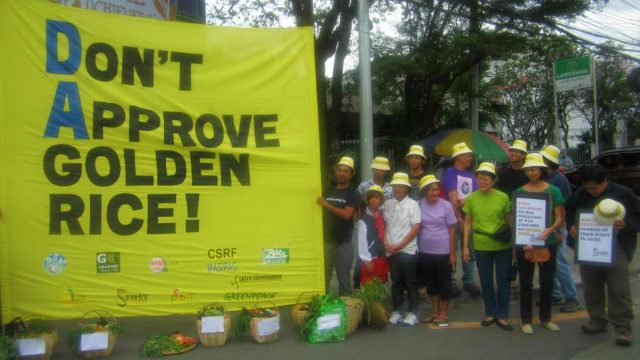SUMMARY
This is AI generated summarization, which may have errors. For context, always refer to the full article.

MANILA, Philippines – As the debate on the use of genetically-modified organisms (GMOs) in the Philippines remains heated, consumer rights groups have called on the government to ensure the public’s right to information on, and choice of, safe food.
According to Consumer Rights for Safe Food (CRSF), this can be achieved through proper labeling of foods which contain GMOs.
“As this technology is still controversial, the least that the government should do is to mandate labeling of foods which contain GMOs,” CRSF’s Dr Angelica Galang said.
There are currently 63 countries that require labeling of foods which have GMOs as part of their ingredients.
A study published in Crop Biotech Brief in 2004, mandatory GMO labeling will cost 12% more in the manufacturing process and will likely be passed to the consumers.
Through labeling, Filipino consumers can exercise their right to choose “for the sake of their health and those of the future generations” as most are unaware of the impact of GMOs in their lives.
“Let us fight for the right to safe and healthy food,” Galang said.
The problem with Golden Rice
GMOs are crops with genetic compositions altered to insert specific characteristics: pest resistance, vitamin enrichment, and to increase growth.
CSRF reported that these organisms infiltrate the food system in 3 ways: processed foods, seeds for planting, and feeds of chickens, cows, and pigs.
As much as its reported benefits, GMOs have been in the spotlight because of their alleged bad effects.
In the Philippines, rice crops are the most controversial. (READ: Golden rice to be launched in 2016)
“They want to give us golden rice,” Galang said. “Ang ganda pakinggan pero mapanganib (It sounds good but it’s dangerous.)”
According to CRSF, the lack of long-term study on its effects on humans is a “red flag.” In addition, several evidence from experiments point out of GMOs’ effects on animals.
“Evidence comes from animal experiments in laboratories,” Galang emphasized. “Worse, the threats seem to be transferrable to offspring of parents down to the third generation.”
Meanwhile, Greenpeace Philippines questions the 20 years spent on the development of Golden Rice, saying that the money used could have been more beneficial to other Vitamin A deficiency solutions.
However, Dr Robert S. Ziegler of the International Rice Research Institute (IRRI) said that the decades-long research and development of the golden rice variety is a “valuable investment.” (READ: Golden Rice: The next GMO battleground)
“This will ensure that farmers will grow it and consumers will happily prepare it as part of their regular meals,” he explained. “Only in this way can Golden Rice contribute effectively in the fight against Vitamin A deficiency that afflicts millions around the world.”
No to processed foods
Crops aren’t the only products to watch out for, Galang emphasized, as GMOs are also seen in processed products.
“Hindi healthy ang processed food pero marami pa rin ang pumipili dito,” she said. “Ito ay nakakabahala kasi hindi na rin maganda ang health status ng bansa natin.”
(Processed foods are not healthy but a lot of people still choose them. This is alarming as the country’s health status is not good anymore.)
The public holds the key in ending the rise of processed foods in the market.
“Let’s avoid them when we go to markets kasi if hindi natin bibilhin at mawawala ang demand, hindi sila magpoproduce,” Galang encouraged. “We should also educate other consumers.”
(If we do not buy their products, the demand wouod diminish. They won’t produce anymore.) – Rappler.com
Add a comment
How does this make you feel?
There are no comments yet. Add your comment to start the conversation.